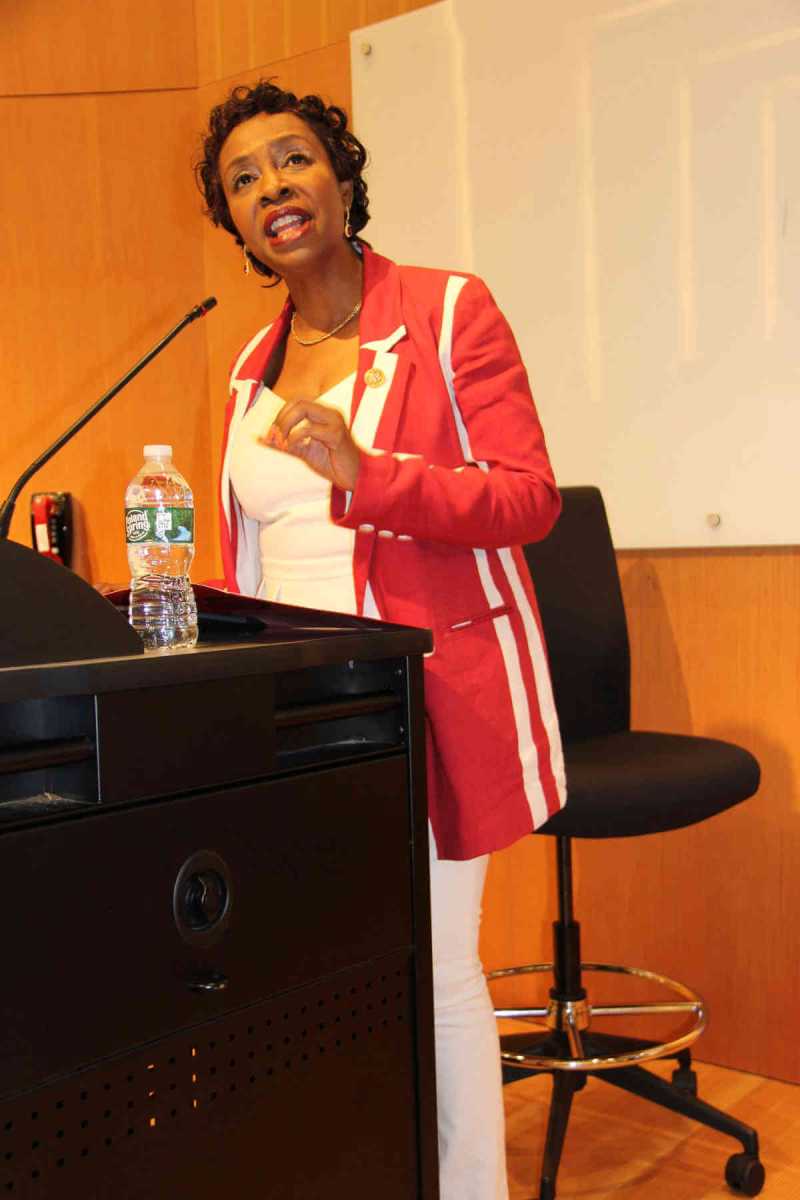In the wake of Hurricane Dorian’s destruction, Brooklyn Congresswoman Yvette D. Clarke on Sept. 10 introduced in the United States House of Representative legislation that would provide Temporary Protected Status (TPS) for Bahamian nationals.
Clarke, the daughter of Jamaican immigrants who represents the 9th Congressional District in Brooklyn, along with fellow Caribbean Caucus Co-Chair Congresswoman Stacey Plaskett, and Congresswoman Barbara Lee, introduced the measure Tuesday afternoon.
Plaskett is the delegate to the United States House of Representatives from the US Virgin Islands’s at-large congressional district. Lee represents California’s 13th Congressional District in Congress.
“My legislation — the TPS for Victims of Hurricane Dorian Act — will help provide some respite in America for people whose lives have been drastically impacted by Hurricane Dorian in the Bahamas,” Clarke told Caribbean Life after the bill’s introduction. “When life throws a massive curve ball, Americans stand up to help those who have fallen on bad luck. As a Caribbean-American myself, my heart hurts for those whose lives have changed as they know it back home in the Caribbean. My legislation will assist in easing these folks’ new reality as a result of the devastation they’ve experienced from Hurricane Dorian.”
Specifically, Clarke said the TPS for Victims of Hurricane Dorian Act would allow Bahamians in the United States to remain in the country during “this difficult chapter for the islands under the TPS program.”
“There is a longstanding history of using this program to permit victims of natural disasters and other humanitarian crises in designated countries,” she said.
The U.S. Congress created TPS in the Immigration Act of 1990. It is provided to nationals of specifically designated countries that are confronting an ongoing armed conflict, environmental disaster, or extraordinary, temporary conditions.
TPS provides a work permit and stay of deportation to foreign nationals from those countries who are in the United States at the time the US government makes the designation.
According to the American Immigration Council (AIC), the U.S. Secretary of Homeland Security has discretion to decide when a country merits a TPS designation. It said a TPS designation can be made for six, 12 or 18 months at a time.
In order to qualify for TPS, AIC stated, an individual “must be a national of the foreign country with a TPS designation (or if stateless, have last habitually resided in a country with a TPS designation); be continuously physically present in the United States since the effective date of designation; have continuously resided in the United States since a date specified by the Secretary of Homeland Security; and not be inadmissible to the United States or be barred from asylum for certain criminal or national security-related reasons, such as individuals who have been convicted of any felony or two or more misdemeanors.”
Official and relief agencies in the Bahamas said on Tuesday that the damage Hurricane Dorian wreaked on roads, airports, communication grids and other infrastructure is presenting a “logistical nightmare” for emergency responders and aid workers trying to get basic supplies to the neediest storm victims.
“Anywhere we could put a warehouse has been destroyed by floodwaters and may not be safe for storing supplies. Communications are down, electricity is down,” Christy Delafield told U.S. National Public Radio. She’s with the aid group Mercy Corps, which has a team on the Grand Bahama Island.
“Any of the things you would normally do in a response are going to be 10 times harder because the systems that support them do not exist anymore,” she added.
In the Abaco Islands and on Grand Bahama, two of the hardest hit areas, NPR said air-traffic controllers are “struggling to keep up with the number of incoming flights carrying humanitarian aid, and transport vehicles to distribute it are in short supply.”
As of Sept. 10, the official death toll in the Bahamas from Hurricane Dorian stood at 50, with officials expecting it to keep rising, according to NPR.
With winds of 185 mph and storm surges higher than 20 feet in places, NPR reported, Dorian was one of the strongest storms in modern records to hit land in the Atlantic. U.S. officials say they have processed thousands of evacuees from the Bahamas arriving by plane and on cruise ships, according to NPR.
But it said it’s unclear whether the Trump administration will grant Bahamians TPS, which would allow evacuees to live and work in the U.S.


























